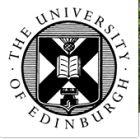Matter
In the classical physics observed in everyday life, matter is any substance that has mass and takes up space by having volume. All everyday objects that we can touch are ultimately composed of atoms, which are made up of interacting subatomic particles, and in everyday as well as scientific usage, "matter" generally includes atoms and anything made up of these, and any particles (or combination of particles) that act as if they have both rest mass and volume. However it does not include massless particles such as photons, or other energy phenomena or waves such as light or sound. Matter exists in various states (also known as phases). These include classical everyday phases such as solid, liquid, and gas - for example water exists as ice, liquid water, and gaseous steam - but other states are possible, including plasma, Bose–Einstein condensates, fermionic condensates, and quark–gluon plasma.
Matter
Of course, we must avoid postulating a new element for each new phenomenon. But an equally serious mistake is to admit into the theory only those elements which can now be observed. For the purpose of a theory is not only to correlate the results of observations that we already know how to make, but also to suggest the need for new kinds of observations and to predict their results. In fact, the better a theory is able to suggest the need for new kinds of observations and to predict their results correctly, the more confidence we have that this theory is likely to be good representation of the actual properties of matter and not simply an empirical system especially chosen in such a way as to correlate a group of already known facts.
David Bohm, "A Suggested Interpretation of the Quantum Theory in Terms of 'Hidden' Variables," (January 15 1952). Physical Review 35 (2): 189.
Matter
Leibniz reversed the traditional conception of mind and matter by applying attributes of matter (in terms of sensory experience) to mind. Mind is what it experiences. Every mind or soul becomes an independent attribute of the universe, divinely ordered or arranged. Leibniz’s focus truly was mind.
Alan Ebenstein, Hayek's Journey: The Mind of Friedrich Hayek (2003), Ch. 2. German and Viennese Intellectual Thought
Matter
Matter in quantum mechanics is not an inert substance but an active agent, constantly making choices between alternative possibilities according to probabilistic laws. ...It appears that mind, as manifested by the capacity to make choices, is to some extent inherent in every electron. ...Our brains appear to be devices for the amplification of the mental component of the quantum choices made by molecules inside our heads. ...There is evidence from peculiar features of the laws of nature that the universe as a whole is hospitable to the growth of mind. ...an extension of the Anthropic Principle up to a universal scale.
Freeman Dyson, Infinite in All Directions (1988)

